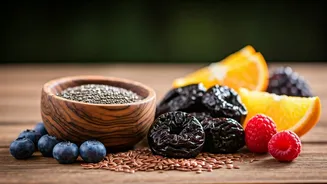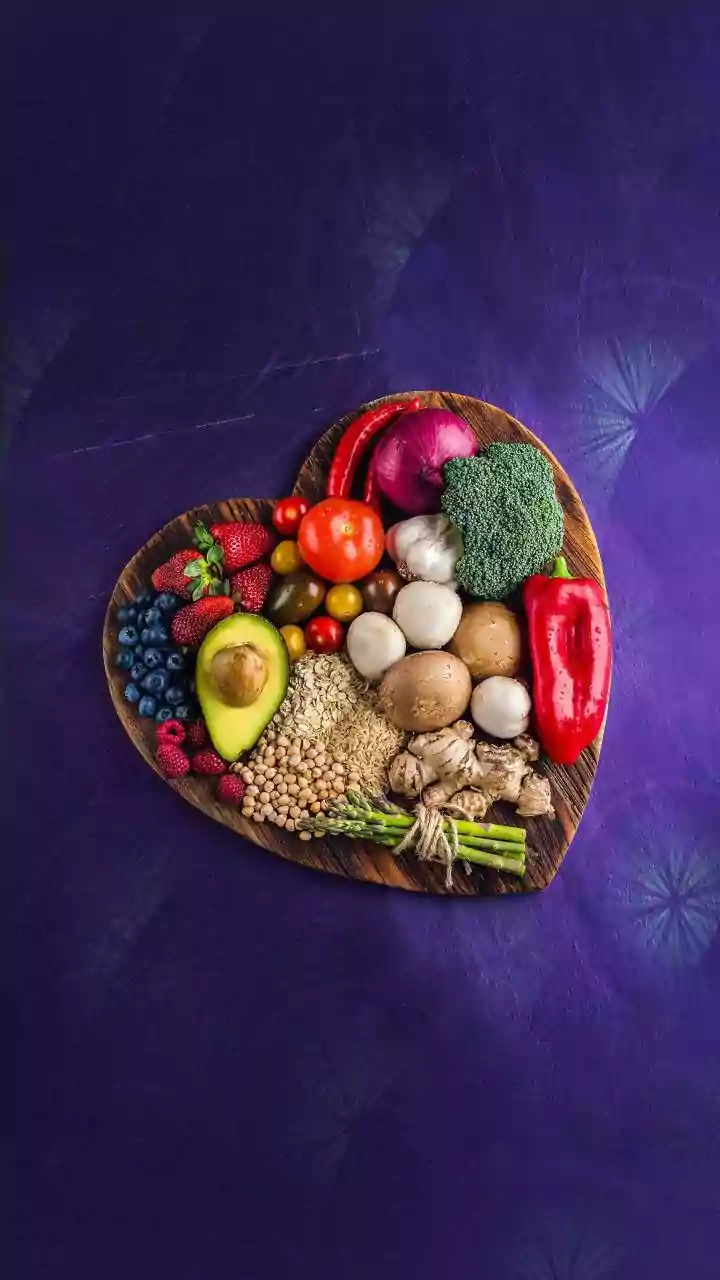Fiber's Constipation Solution
Constipation, a common digestive issue, can cause significant discomfort. Understanding how fiber-rich foods aid digestion is the first step toward relief.
Fiber, a type of carbohydrate that the body cannot digest, adds bulk to the stool, making it easier to pass through the intestines. This process stimulates bowel movements, providing relief from constipation. The Harvard-trained gastroenterologist highlights ten foods known for their high fiber content and their ability to quickly alleviate constipation symptoms. Incorporating these foods into your diet can significantly improve digestive health and regularity. Fiber-rich foods also offer other health benefits, such as promoting a feeling of fullness, which can assist in weight management, and helping to regulate blood sugar levels, contributing to overall well-being. Focusing on a diet rich in these natural remedies could be a simple, effective method to avoid discomfort.
Chia Seeds: Tiny Powerhouses
Chia seeds, tiny yet powerful, are packed with soluble and insoluble fiber, making them excellent for relieving constipation. When chia seeds are consumed, they absorb water and expand, forming a gel-like substance that adds bulk to the stool and helps it move smoothly through the digestive system. This bulk stimulates the intestines, promoting regular bowel movements. Besides their high fiber content, chia seeds also provide essential nutrients such as omega-3 fatty acids, antioxidants, and minerals. They can be easily incorporated into your diet, whether sprinkled on yogurt or added to smoothies, making them a versatile and effective solution for constipation. Consuming chia seeds is a convenient and natural method to support digestive health and combat constipation. Their nutritional benefits extend beyond just fiber, making them a great addition to a balanced diet.
Pears and Prunes: Natural Aids
Pears and prunes have long been recognized for their effectiveness in alleviating constipation. Pears, high in fiber and sorbitol, act as a natural laxative. Sorbitol, a sugar alcohol, draws water into the intestines, softening the stool and promoting bowel movements. Prunes, equally known for their benefits, are also rich in fiber, and contain a compound called dihydrophenylisatin, which stimulates bowel contractions. Both fruits offer a convenient and tasty way to improve digestive health. Including pears and prunes in your daily diet is a simple yet effective strategy to maintain regularity and reduce constipation symptoms. Whether eaten whole, added to meals, or consumed as juice, they provide natural relief and contribute to a healthier digestive system. These fruits stand out as readily accessible and enjoyable remedies for constipation.
Sweet Potatoes for Fiber
Sweet potatoes are a nutritious source of fiber, providing a significant amount that helps to ease constipation. The fiber in sweet potatoes adds bulk to the stool, facilitating easier passage through the intestines. Besides fiber, sweet potatoes offer a wealth of vitamins, minerals, and antioxidants, contributing to overall health. Preparing sweet potatoes is also easy. They can be baked, boiled, or roasted and added to various meals. By incorporating sweet potatoes into your diet, you provide your body with both fiber and a range of vital nutrients, supporting a healthy digestive system. They offer a simple and delicious way to increase fiber intake, helping to prevent and alleviate constipation while providing added health benefits. Their versatility makes them a great option for meal planning.
Oats: Soluble Fiber's Role
Oats are an excellent source of soluble fiber, which plays a crucial role in improving digestive health and relieving constipation. Soluble fiber dissolves in water, forming a gel-like substance that adds bulk to the stool and softens it, making bowel movements easier. Oats also contain insoluble fiber, further enhancing their effectiveness in promoting regular bowel movements. Starting your day with a bowl of oatmeal is a simple yet effective way to incorporate oats into your diet and promote a healthy digestive system. Oats are versatile, and can be enjoyed with fruits, nuts, or seeds, making them adaptable to different tastes and dietary needs. The consumption of oats helps maintain regularity and supports the overall health of the digestive system.
Spinach for Constipation
Spinach, a leafy green vegetable, provides significant fiber, making it a valuable food for relieving constipation. The fiber in spinach adds bulk to the stool, easing its movement through the digestive tract. Spinach also contains magnesium, which helps relax the intestinal muscles, further aiding in bowel movements. Easily incorporated into salads, smoothies, or cooked dishes, spinach is a versatile addition to any diet. Its high nutrient content enhances its health benefits, offering vitamins, minerals, and antioxidants. Regular consumption of spinach supports digestive health and contributes to overall well-being. Choosing spinach is a simple and effective approach to fighting constipation while adding essential nutrients to your diet.
Flax Seeds: Packed Fiber
Flax seeds are packed with both soluble and insoluble fiber, making them a powerhouse for alleviating constipation. The fiber in flax seeds adds bulk to the stool, while their natural oils help to lubricate the digestive tract, facilitating smooth bowel movements. These seeds are also rich in omega-3 fatty acids, contributing to overall health. Incorporating flax seeds into your diet is simple: they can be ground and sprinkled on cereals, added to smoothies, or mixed into baked goods. Ground flax seeds are easier to digest, maximizing the absorption of their nutrients and fiber. Regular consumption of flax seeds provides a natural and effective way to manage and prevent constipation. Their versatility and nutritional benefits make them a valuable addition to a healthy diet.
Papaya: Digestive Enzyme Power
Papaya contains the enzyme papain, which helps break down proteins and aids in digestion, making it a valuable food for relieving constipation. Papain also has anti-inflammatory properties, which can help soothe the digestive tract and improve bowel regularity. Furthermore, papaya is rich in fiber, which adds bulk to the stool and encourages smooth movement through the intestines. Its natural sweetness and tropical flavor make it an enjoyable addition to your diet. Consuming papaya offers a delicious way to support digestive health and combat constipation. Whether eaten fresh, in a smoothie, or as part of a meal, papaya offers a refreshing and effective remedy. The presence of papain enhances its ability to support healthy digestion.
Lentils: High Fiber Content
Lentils, a type of legume, are packed with both soluble and insoluble fiber, making them excellent for relieving constipation. The fiber in lentils adds bulk to the stool, promoting regular bowel movements. Lentils are also a great source of protein and other essential nutrients, contributing to overall health. Easy to prepare and versatile in various dishes, lentils can be added to soups, stews, or salads. Consuming lentils is a cost-effective and nutritious way to increase your fiber intake and support a healthy digestive system. Regular intake of lentils can help to maintain regularity and ease constipation symptoms. Their versatility and nutritional benefits make lentils a valuable part of a balanced diet.
Kiwi: Unique Remedy
Kiwi fruit has been found to be helpful in relieving constipation, thanks to its unique combination of fiber and enzymes. The fruit contains both soluble and insoluble fiber, adding bulk to the stool, and also contains actinidin, an enzyme that aids in the breakdown of proteins and improves digestive function. Regular consumption of kiwi can help to improve bowel regularity and ease constipation symptoms. Its refreshing taste and ease of consumption make it a pleasant addition to any diet. The properties of kiwi make it an effective and delicious remedy. Adding kiwi to your daily meals can contribute significantly to a healthier and more comfortable digestive experience.
























